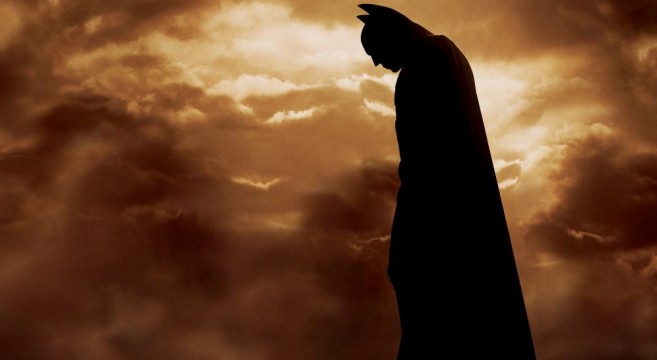Engelsk översättning och förbättring av ett tidigare inlägg.
It happens more and more frequently that anti-modern messages and themes are presented through modern media, like literature, music and film. It is obvious that there is such a message in LoTR, it is less evident in Star Wars, and it is discernible in Matrix. Movies with a traditional message usually becomes large successes with the audience, and one often get the impression that they remain for a long time in the minds of the audience (something of the katharsis-effect that good plays should result in). The audience longs for something new and fresh, they long for Tradition, Being and Meaning.
Batman Begins
Several themes are discernible in Batman Begins, themes with a close affinity to, or origin in, radical conservative and traditional circles.
In the beginning of the movie, the main character, Bruce Wayne, is stuck in the middle of a nihilist ”steel-bath”. He has tried to explore the criminal underworld, and he has become ”truly lost”, which is symbolically expressed through him being in a Chinese (?) prison. Controlled by his own emotions and passions (mostly guilt, anger and fear), and without ideals, without a solid Center; the main character is in prison also internally.
This is where he gets in touch with what is best described as a Traditionalist: Ras al’Ghul. al’Ghul describes the way to his fortress in the distant mountains to Bruce, a long and hard journey that ends with him having to fight for his life even though he is exhausted from the travel. ”Death does not wait”. After this, Wayne begins his training in the League of Shadows.
League of Shadows reminds us somewhat of the Traditional (mostly Guenon) thoughts about Le Roi du Monde/the King of the World. The basic idea is that there is a hidden city in the innermost Himalayas, often pictured in the inner parts of the Earth, where a race of advanced beings live, under the rule of the King of the World, the Central Axis. This is aspiritual Center, hidden during the Kali Yuga. With a little good will, Ras al’Ghul and the League of Shadows can be seen as symbols for the Chakravarti and Agartha.
The traditional idea of the connection between the external, worldly, and the inner war/struggle also becomes clear in Waynes journey to the monastery, and in his training. It is impossible to separate his physical hardships from his inner hardships, since he has to defeat his inner ”demons” during the joutney, even though they scream at him that he has to turn back, that he’ll freeze to death, that it hurts, that he is hungry. This connection between inner and outer struggle is central in the Islamic Jihad-concept (after all, during the Jihad, one is really only fighting ones own fear), but exists in most other traditions as well.
Once in the monastery, al’Ghul spreads wisdoms with various value over Wayne and the viewer, a mix of nietzscheanism (”training is nothing. The Will is everything”, ”your father failed because he failed to Act”), eastern wisdom (”you have sacrificed secure footing for a killing blow”, ”mind your surroundings”), and jungianism.
You must become more than a Man, you must become an Idea
The Jungian theme is central in Batman Begins. At one point, the antagonist Scarecrow explains that the mentally ill often externalizes their inner demons to an outer figuer, a scarecrow, a jungian archetype.Batman himself is also such a Jungian archetype, from the collective subconscious, fetched from the depths of Waynes own fear, that he has managed to conquer. He is a dark archetype, connected to the night, bats, and the criminals fear of retribution/divine justice. The heroic antropology in the movie, where a small group of Overmen are contrasted to the lost masses, need not be commented since it is very obvious.
One can also see a traditional thought in the Batman-persona. Evola writes that in traditional societies, one often gave up ones birth-name once one was appointed to certain functions. One ceased to be NN, the human person, and became the Pope, the Executioner, the Templar; one with the function, more than a human. The Pope is the only remaining example methinks.
The conflict between Batman and the League of Shadows is also interesting. al’Ghul explains that they have for millenia striked against civilizations in the depths of corruption, to give them the final ”push” into death. They sent the plague-rats to Europe, they killed Constantinople, and now it is Gothams turn. They also execute criminals, when the state is too weak to do it. Wayne/Batman reacts against this, since it results in suffering for the innocent, and the movie is henceforth built around their conflict.
Both perspectives can find legitimation in Tradition. League of Sahdows ”does what is necessary” to borrow a quote from the Gita. They get rid of all human emotions, including compassion and pity. The parallells to the Italian neofascists who, inspired by Evola, blew up many civilians to provoke civil war, are obvious. Wayne cannot imagine killing innocents, and chooses the path of the ksatriya, defending the nation that he is part of against external threats (and at the same time purging it from corrupt power-structures). He is also forced to place himself above mere human emotions, in his case his feelings toward his teacher.
Of course one can doubt if al’Ghul is really beyond mortal emotions, his descriptions of Gothams citizens occassionally reek of moralism.
And last but not least, some more films of value for the Traditionalist:
Last Samurai: http://www.rosenoire.org/reviews/last-samurai.php
Fight Club: http://www.national-anarchist.org/articles/SUMMER2003AchillesKritikos1.html
http://earth.prohosting.com/foreach/philo/fightclub.html













